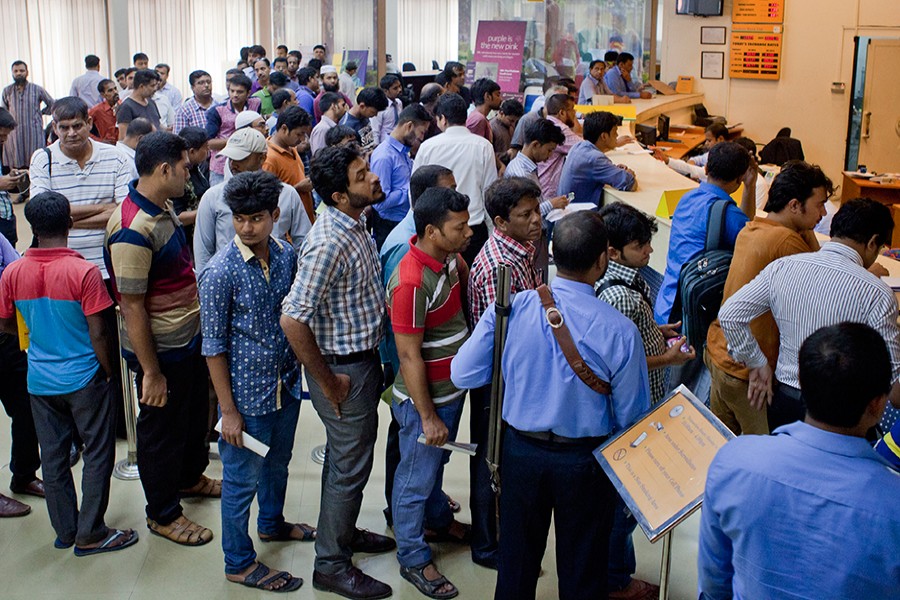The overall deposit growth in the country's private commercial banks (PCBs) fell further last year despite allowing the state-owned enterprises (SoEs) to deposit of half their funds with them.
The falling trend in deposit growth pushed up further advance-deposit ratio (ADR), which was higher than that of the safe limit, set by the Bangladesh Bank (BB) earlier, officials said.
The deposit growth in all 40 PCBs had been on a decline, slumping from 12.58 per cent on December 31, 2017 to 11.46 per cent on the same day of the last calendar year and 13.73 per cent as on December 31, 2016.
Most of SoEs still prefer to deposit their funds with public banks rather than the PCBs, according to the banking sector insiders.
The state entities, particularly the Bangladesh Petroleum Corporation (BPC), are opening their letters of credit (LCs) for importing fuel oils with the state-owned commercial banks (SoCBs), they added.
Besides, lower cash recovery along with rescheduled loans is also responsible for the lower deposit growth, the insiders noted.
Meanwhile, the amount of rescheduled loans jumped by more than 21 per cent or Tk 40.90 billion in the last calendar year due to the national election that was held on December 30.
The volume of rescheduled loans rose to Tk 232.10 billion as on December 31, 2018 from Tk 191.20 billion on the same day of the previous year, according to the central bank's latest statistics.
The rescheduling of non-performing loans (NPLs) increases in each election year, according to the insiders.
They also said lower deposit growth of at least five largest banks has pushed down the overall growth among the PCBs.
In April 2018, the government allowed the public entities to deposit 50 per cent of their funds with the private banks, up from the earlier ceiling of 25 per cent, to help mitigate the liquidity crunch in the banking system.
"We expect the deposit growth to improve in the near future as the government has taken an initiative to develop database on its savings certificates," Syed Mahbubur Rahman, chairman of the Association of Bankers, Bangladesh (ABB), told the FE on Sunday.
"But we may face difficulties in achieving respected credit growth to the private sector at 16.50 per cent by June 30 with the existing deposit growth," noted Mr. Rahman, also managing director (MD) and chief executive officer (CEO) of Dhaka Bank Limited.
Meanwhile, the credit growth of all 40 PCBs came down to 14.32 per cent on December 31, 2018 from 19.90 per cent on the same day of previous year. It was 17.70 per cent as on December 31, 2016.
Talking to the FE, Mehmood Husain, MD and CEO of NBR Bank Limited, said, "We've to boost the financial inclusion programme across the country to collect 'core deposit' from the un-banked people."
He also said the banks should go to rural areas along with urban ones to mobilise deposit growth.
"Both bankers and policy markers' should taken long-term initiative to attract depositors," the senior banker noted.
He recommended that the yield on national savings certificates be re-fixed, considering the overall market situation, which will help increase deposit growth in the banks.
In contrast, the ADR of PCBs rose to 85.93 per cent as on December 31 last from 84.68 per cent on the same day of 2017, according to the central bank statistics. It was 81.25 per cent in 2016.
"The PCBs crossed the ADR limit in 2018 mainly due to the lower deposit growth than credit," a senior executive of a leading PCB told the FE.
Earlier on January 30 last year, the central bank slashed the limit of ADR to help check any possible liquidity pressure on the market due to the banks' 'aggressive' lending.
The ADR has been re-fixed at 83.50 per cent for all the conventional banks and at 89 per cent for the Shariah-based Islamic banks. The existing ratios are 85 per cent and 90 per cent respectively.
The banks had to adjust it gradually by June 30, 2018.
Later, the BB extended the deadline three times for the implementation of the revised ADR by the banks.
Under the extended timeframe, the banks are allowed to implement the revised limit of ADR by September 30 instead of March 31, 2019.


